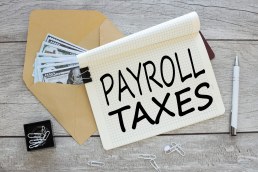
When you’re running a business, there’s no shortage of things to worry about — but few are more dangerous than falling behind on payroll taxes. The IRS takes unpaid payroll taxes extremely seriously, and if left unresolved, these debts can threaten not just your business, but your personal finances too.
At Total IRS Relief, we specialize in helping business owners confront payroll tax issues before they spiral into full-blown IRS enforcement. If you’ve received letters about Form 941 or trust fund taxes, here’s what you need to know.
Why Payroll Tax Debt Is So Risky
Payroll taxes include the amounts withheld from your employees’ paychecks, along with the employer’s matching share. When you fail to deposit these taxes on time, the IRS views it as a serious breach of trust — because you’re holding money that was meant to go directly to the government on behalf of your employees.
Unlike income taxes, payroll tax issues can result in much harsher penalties and quicker enforcement. The IRS may seize business assets, freeze bank accounts, or file federal tax liens — and in some cases, they may pursue personal liability against owners, officers, or those responsible for handling payroll.
The Trust Fund Recovery Penalty (TFRP)
If the IRS determines that someone at your company willfully failed to deposit payroll taxes, they can assess the Trust Fund Recovery Penalty. This allows them to bypass the business entirely and go after personal assets, including wages and bank accounts. The standard for “willful” behavior is low — even neglecting to act can qualify — which is why early intervention is so important.
How to Handle Payroll Tax Debt
The most important step is to stop ignoring it. Many business owners fall into the trap of waiting for revenue to improve or trying to handle it quietly, hoping the IRS won’t act. But the longer you wait, the fewer options you’ll have.
At Total IRS Relief, we begin by reviewing your IRS records, assessing your liability, and communicating with the Revenue Officer (if one has been assigned) to stop the bleeding. We can help you negotiate a manageable payment plan, submit documentation for penalty relief, or pursue other resolution options based on your situation.
In some cases, we can help business owners avoid the Trust Fund Recovery Penalty altogether by demonstrating that they were not responsible for the tax decisions — or by negotiating on their behalf before the IRS finalizes its assessment.
There’s a Way Forward — Even with IRS Pressure
No one starts a business expecting to fall behind on payroll taxes. But whether you’ve missed one deposit or haven’t filed for several quarters, there’s still time to resolve it — if you act quickly and strategically.
At Total IRS Relief, we’ll fight to protect your business and personal assets while helping you fix the problem for good. If payroll tax issues are threatening your company’s future, contact us today for a confidential consultation.
Enter your contact information to schedule your FREE one-on-one consultation. Our tax experts will get back to you as soon as possible.

